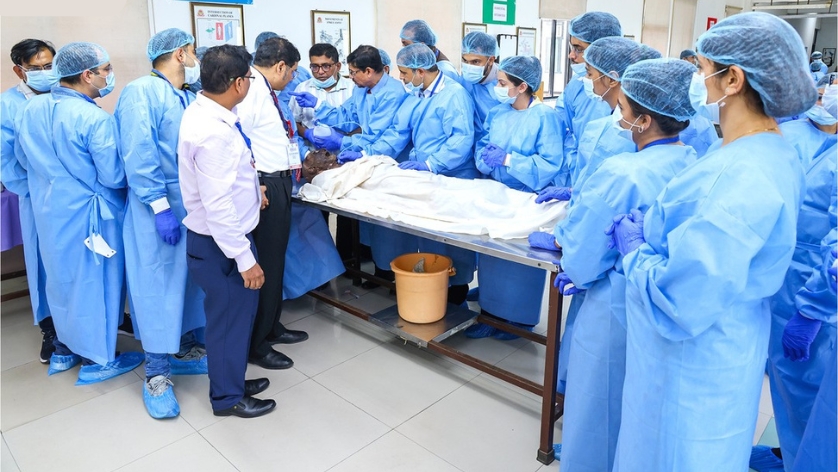Cadaveric Airway Workshop at TMU
Teerthanker Mahaveer University, one of the best private universities in India, recently hosted a Cadaveric Airway Workshop. Expertise in airway management is critical in reducing morbidity and mortality rates in both elective and emergency medical situations. Recognising the importance of this skill, the Department of Anesthesia, in collaboration with the Department of Anatomy at Teerthanker Mahaveer Medical College and Research Centre (TMMC&RC), organised a highly anticipated Cadaveric Airway Workshop on September 1st, 2024. This unique workshop offered medical professionals hands-on experience in airway management using cadavers, simulating real-life scenarios.
Workshop Overview
The Cadaveric Airway Workshop was designed to provide an immersive learning experience for more than 110 delegates from various prestigious medical colleges, including those from Meerut, Bareilly, Ghaziabad, Dehradun, and Gorakhpur. With a practical focus, the workshop offered live-like simulations and sessions, allowing participants to master various airway management techniques.
Purpose of the Workshop
The workshop focused on reducing mortality in critical situations, particularly in emergency settings. By offering a hands-on cadaver experience, doctors were able to practice life-saving techniques under the guidance of leading experts. The workshop further emphasised the role of ultrasound technology and other advanced tools in airway management. Headed by Dr Mukesh Kumar Prasad, the Department of Anesthesia played a pivotal role in organising the workshop. The contribution by the Department of Anatomy provided a realistic learning environment for doctors.
Leading Experts and Institutions
Participants had the privilege to learn from esteemed faculty representing top-tier institutions such as AIIMS Delhi, AIIMS Rishikesh, AIIMS Gorakhpur, AIIMS Patna, AMU Aligarh, Maulana Azad Medical College, LLRM Medical College Meerut, SRMS Bareilly, GIMS Noida, Jolly Grant Dehradun, Life Care Hospital Abu Dhabi, GMC Saharanpur and Synergy Hospital Dehradun. These leading experts not only provided insightful theoretical knowledge but also guided hands-on cadaver-based exercises, offering practical experience in airway management techniques.
Comprehensive Airway Management Training
The workshop featured several specialised workstations, each focusing on different aspects of airway management. Delegates honed their skills in basic techniques like bag-mask ventilation, endotracheal intubation, and the use of supraglottic airway devices. Advanced stations covered difficult airway algorithms, video laryngoscopy, and fiberoptic bronchoscopy, while cutting-edge methods such as ultrasound-guided airway management were also introduced.
Additionally, participants had the opportunity to work with the latest airway devices, gaining practical experience with innovative technologies. The hands-on training with cadavers allowed medical professionals to apply their theoretical knowledge in realistic simulations, offering invaluable experience in managing complex airway scenarios—something not typically possible in traditional medical settings.
Eminent Speakers and Sessions
The day-long workshop included insightful lectures from renowned pioneers in airway management. Experts from AIIMS Delhi discussed "The Role of Ultrasound in Emergency Airway," while faculty from Maulana Azad Medical College and AMU, Aligarh delivered a session on "Difficult Airway Algorithm and Protocols." Additionally, representatives from Synergy Hospital, Dehradun, shared their knowledge on "Innovations in Airway Devices." These sessions provided participants with a thorough understanding of both the current challenges and emerging advancements in the field of airway management.
Learning Outcomes
The key learning outcomes of the workshop included:
- Improved Confidence: Through hands-on practice, delegates gained the confidence required to handle complex airway management scenarios.
- Skill Development: Participants improved their dexterity with modern airway devices, including video laryngoscopes and fiberoptic bronchoscopes.
- Knowledge of New Technologies: The integration of ultrasound techniques into airway management was a focal point, and the delegates were able to appreciate its potential benefits in emergency settings.
- Real-Life Application: The cadaver-based approach provided an authentic learning environment, reinforcing the real-world application of techniques.
Networking Opportunities and Future Prospects
One of the major takeaways from the workshop was the networking opportunities it provided. Delegates from across India had the chance to connect with experts in the field, building professional relationships that could be valuable for their future careers. Given the overwhelming success of this event, there are plans to make the Cadaveric Airway Workshop an annual affair at TMMC&RC. Such workshops are pivotal in building a robust healthcare system by improving the skill sets of medical professionals.
Significance of the Workshop
The Cadaveric Airway Workshop held at TMMC&RC was not just an educational event, but a step forward in the continuous improvement of medical practices. Participants appreciated the opportunity to practice on cadavers, as this experience is seldom offered in traditional medical training. They also valued the focus on both basic and advanced airway management techniques, which can be applied in day-to-day practice. Through hands-on cadaver-based training, participants were able to sharpen their skills and adopt the latest airway management techniques. The collaboration between the Department of Anesthesia and the Department of Anatomy, along with the contributions of leading experts from across the globe, made the event a resounding success.
FAQs
Q1. What was the main goal of the Cadaveric Airway Workshop?
Ans: The primary aim was to provide hands-on training in airway management to reduce morbidity and mortality rates, especially in emergencies.
Q2. Who were the key organising members of the workshop?
Ans: The workshop was led by Dr. Mukesh Kumar Prasad (Chairperson), Dr. Shahbaz Alam (Organising Secretary), and Dr. Payal Jain (Scientific Secretary).
Q3. How many delegates attended the workshop?
Ans: The event catered to over 110 delegates from various medical institutions across India.
Q4. What unique aspect did the workshop offer?
Ans: Delegates were given hands-on practice using cadavers, which provided a real-life simulation experience rarely available in conventional medical training.
Q5. Will similar workshops be held in the future?
Ans: Yes, given the success of the event, plans are underway to host the Cadaveric Airway Workshop annually. For more information, follow TMU’s social media channels.











